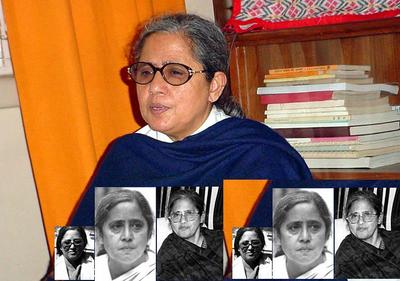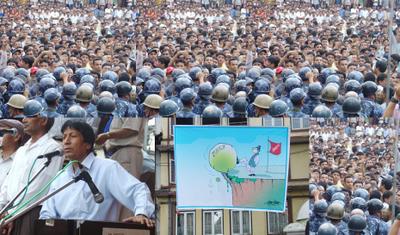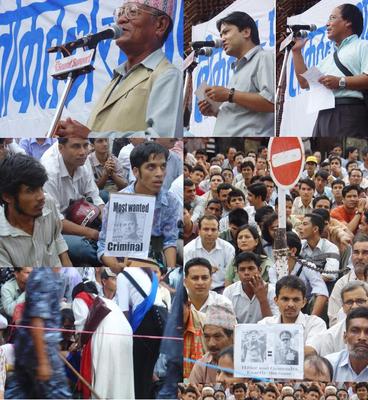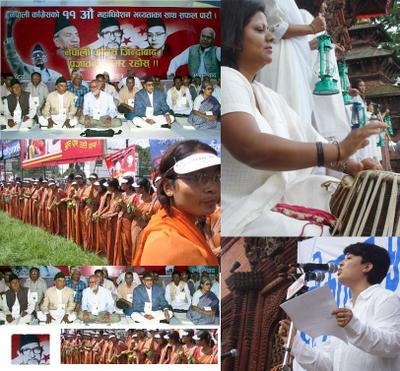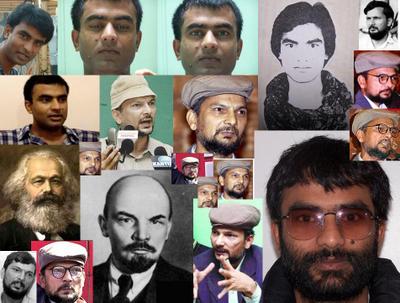
Comrade Baburam, Sir.
I read yesterday with great interest your
latest article, as I always do when you write something new. This is not the first time you have touched upon the theme of a Democratic Republic, but I think this might be the first time you have elaborated upon it and looked at it from many angles. I think this document is going to prove to be of great historic importance within the communist movement.
I am not a communist, you are, I describe myself a progressive, but I have done my share of readings into communist literature. I have read several biographies of Lenin, and that was in the early 90s.
"Power flows through the barrel of a gun." That is the central dictum of classic Maoism. "Jesus is the son of God." That is the central belief in the Christian worldview. Your ideology falls in the social science sphere, and Christianity is a religion, so the two are apples and oranges, but I just wanted to emphasize how central the gun has been to classic Maoism. You have - like only you could - managed to steer your party away from that dictum ideologically. And you have expressed a commitment also to do the same in practice as long as the other players on the national scene play their accompanying political roles.
This is a huge jump you and your party have taken. I commend you for that. Politically blind people in my own democratic camp refuse to see that. I feel sorry for them.
Madan Bhandari introduced the idea of a multi-party framework for his gang of communists, the UML, and that was a significant leap, but your work is more monumental, I think.
Nepal's poor peasants are more like Mao's peasants were, so I can see how Mao might have inspired you. You have drawn inspiration from the idealism of Marx and Lenin, and you have openly condemned the Stalinist deviations. Communists in practice hijacked political liberty, and so they had to suffer couter revolutions worldwide at the end of the last century. In saying that I think you have brought together communist theory and practice in a rather unique way. That synthesis is truly remarkable.
You have done a very good job of handling the many irrational fears of the parliamentary democrats who plain refuse to do the homework long due. You have articulated fears they have not, merely hinted at. That intellectual lethargy on their part has been hurting the peace process. Your proactive approach will serve you and your party well once peace and democracy are achieved. Jasle maha kadhchha, usle haat chatchha.
And you have beat all the democrats in Kathmandu with your ten points to kickstart talks on a future constitution. You have taken an initiative they have not.
Having commended you for your ideological innovation and political initiative and pragmatism, now I would like to draw your attention to some points that I seek further clarification on, or plain disagree with you. My vision is outlined here:
5 Steps. More particularly, I would like to draw your attention to this document:
Proposed Constitution. You have your 10 points, I have an entire draft for a future constitution.
I have said this before. Let the three warring factions and all the component parties take a look at this document. Seek points you all can agree on. Things you can not agree on can be decided upon through a Constituent Assembly. What say you? All you have to do is take a look at the document, pen in hand, check all items you like, cross all items you dislike, and add a list of items you would add and/or modify if you could. How hard can that be? As easy as a multiple choice question test.
This is like every party to the conflict is being given a blank slate and being told, okay so right down all you want. That is what it is. My document just provides a framework so there is some discipline to the process. And such that agreements and disagreements can be aired publicly. The process can stay transparent.
(1) Monarchy. You are an ideological republican. I am not attached to the monarchy, but I am not an ideological republican. I think it is possible to totally defang the monarchy and still keep it. I am not proposing we keep it, but what I am saying is I want to keep that option open so as to have more moving room during the peace process. I know you don't agree with me, and if there is to be a full fledged movement, and especially if there is state repression of that movement, there will be no stopping a republic. But I want to be able to make a few moves before that if the occasion might arise. I just wanted to be upfront and honest. Like you have been upfront and honest. On the other hand, if we end up with a Constituent Assembly, and you have the numbers in that Assembly to declare the state republican, be my guest. The people may take that decision, you and I may not.
(2) Disbanding The State Army. I totally understand it that you have to start with that stand. That is important for your internal consumption among your rank and file. I don't begrudge you for that. And there was at least one occasion back in February when I said the same thing.
Just like Girija lives a contradiction. He has yet to make up his mind on whether the 1990 document is dead or alive. I think you Maoists also live a contradiction. Once you have already made an ideological shift away from the "barrel of a gun," why do you still have a hangover about your armed cadres? Integrating the two armies in a fair way is step 1. Whatever your starting point, I hope you come to the table with an open mind and plenty of room for flexibility. This is what I suggest.
- There should be only one army in the country and that army should be in the barracks under the command of the Prime Minister of the interim government. That is the precondition for a Constituent Assembly. If you can not come around to that, you are not serious about a Constituent Assembly.
- If the RNA has 83,000 and PLA has 12,000 armed personnel, 3,000 of the PLA personnel get inducted into the army which gets five years to downsize itself to a total strength of 30,000 or less during which the 3,000 from the PLA stay on.
- 56,000 of RNA personnel and 9,000 of PLA personnel get retrained for jobs in the private sector. For that retraining foreign aid is sought.
Just like the
Proposed Constitution, this is a framework for discussion, not anything written in stone. But the Maoists and the democrats will have to express their agreements and disagreements publicly and in a transparent manner.
(3) Self Rule And Autonomy For Janajatis And Madhesis. How do you like my three states, three languages idea? My demarcations are one person one vote taken to its logical conclusions. I think my proposal is the most scientific. I do not doubt the honesty of your commitment, not at all. Infact my political sympathies for the Maoists have been based on this commitment of yours. On the other hand, I am suspicious of the democrat Bahuns. Many of them are still talking of some kind of a decentralization so as to water down the idea of federalism. They are banging their head against the wall. Federalism is one certainty of the next constitution. On that there is not going to be any compromise.
(4) Education, Health. I could not agree more. Here we will just have to compete to outdo each other. I feel about these two issues as strongly as you feel about land reform.
(5) The Market Mechanism. That is the biggest gaping hole in your document, I think. Democracy is not possible without it. The market is the hen that lays the golden egg that will make our ambitious education and health plans possible. Just like deviated communists have had the tendency to ban other political parties, they have also had the tendency to kill the hen. The state has to be there to uphold the law, but beyond that it is the private sector that does the wealth creation. The details of what I propose are already in the
Proposed Constitution.
In your writing there are several contradictions. You talk about guaranteeing employment. I am suspicious. What do you mean? It is not the state but the private sector that creates jobs, for the most part. The state does create jobs to perform its necessary functions. But it is not wise for the state to create jobs just so people can have jobs: that way you end up wasting the taxpayers' hard-earned money. Although there can be room for targeted job creations for some targeted low income groups in specific cases. That I give you.
Instead the focus should be on health, education and micro credit. The poorest of the poor can have ladders they can climb.
"
Self- reliant national industrialization, protection of national capital and properties."
I am extremely suspicious of this. First of all, Marwadis are part of the Madhesi community. And they get demonized much on this issue. You have to watch out for that.
You really need to learn from the Chinese on the issue of Foreign Direct Investment. They will tell you, the rule is simple: the more the merrier. That's it.
You can have that, or you can have Nepalis going away thousands of miles to foreign countries, staying away from their families for months and years because jobs are not locally available. FDI is the best way to create good jobs locally, fast.
But then this is policy talk. This can not be part and parcel of a Constituent Assembly. This is for the elections held after the country has a new constitution. At that point, you would be free to disagree with my common sense assertion, if you might so choose.
(6) Land-To-The-Tiller Land Reform. This makes tremendous economic sense to the free marketeer in me. If that could be done, the productivity in the agriculture sector would go up drastically. To that add the micro credit idea, and you are going to end up with a green revolution. I am all for it.
But I would like to suggest we be careful about the political aspects of its implementation. I hope you don't change your stand on this, but I hope you do not make it a precondition before elections to a Constituent Assembly can take place. Let those who disagree do so, just cash on that disagreement politically. If you are the only party that is going to have the land-to-the-tiller slogan, and elections are going to be free and fair, you are going to emerge the largest party. Simple as that. And once you have a governing majority in the parliament, the disagreeing parties can cry hoarse, and they are not going to matter. At that point you implement the reform. So my suggestion, consider it step 2, not step 1.
Another attraction of the land-to-the-tiller slogan is you are not saying collectivization. You are saying right to property. That is key. Right to property is like right to free speech, right to assemble, right to vote: it is basic. Without property rights, there is no market. Without market, there is no democracy.
(7) Political Party Finances. For a party and leader who dream of a classless society, I am utterly surprised you don't even touch on that topic. Is it because the Maoists are the richest of all political parties in Nepal? How would you like this?
The Maoists need to make note of
Article 1.8: Political parties may not engage in fund-raising activities. Instead each national party, described as those that garnered at least 5% of the votes in the previous nationwide elections, will get an annual sum that will be directly proportional to the number of votes it earned. That money is to be used for party-building and electioneering activities. Details of expenses are to be posted online in the three languages to the last paisa on at least an annual basis.
The other parties are keen to see you disarm. But noone is talking about your money. The money might hurt them more electorally.
My proposal on campaign finance reform might be what makes my documents stand out, I think. The document envisions a democracy where money is taken out of the system. It is truly one person one vote.
In sum, I would like to commend you for the ideological leap you have taken, thank you for taking the initiative with the ten points, and I look forward to future conversations. I hope we can march towards peace, democracy and progress. And I hope you will compensate for the mental lethargy of the democrat Bahuns by taking further initiatives down the line.
